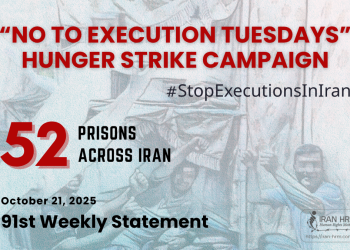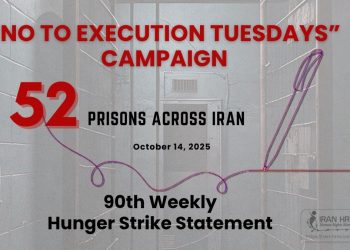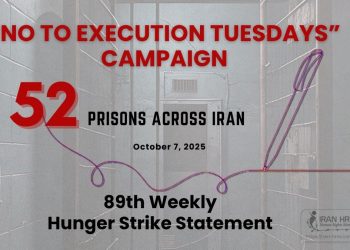Protesting prisoners in Iran entered the 20th consecutive week of their hunger strike on Tuesday, June 11, 2024, as part of the ” No to Execution Tuesdays ” campaign. The prisoners view the death penalty as a core mechanism of repression, particularly during the period of elections, which they describe as a government performance meant to distract from internal crises.
——–
In a statement marking the 20th week of the hunger strike, the prisoners declared:
“In the midst of this election sham, the Islamic Republic suppresses its people and escalates executions as a means of controlling its crises. On one hand, the regime needs this spectacle, while on the other, it fears protests and rising factional tensions. To manage these threats, the government continues to arrest activists and protesters, intensify its oppression of women, hand down harsh sentences, and reinforce repression through increased executions—even within the context of elections.”
Iran is responsible for 75 percent of the world’s executions, holding the grim record for the highest execution rate globally.
Just last week, the Iranian government executed at least eight prisoners for various offenses and sentenced political prisoner Mamusta Mohammad Hadranejad to death for his involvement in the People’s Right Movement in 2022. This, the prisoners assert, is yet another demonstration of the government’s unwavering commitment to the death penalty.
In response to the intensifying repression and wave of executions, prisoners participating in the “No to Execution Tuesdays” campaign across multiple facilities—including the Women’s Ward and Wards 4, 6, and 8 in Evin Prison, Qezel-Hesar (Units 3 and 4), as well as Markazi Karaj, Khorramabad, Khoy, Naqadeh, Mashhad, and Saqqez Prisons—have announced their 20th consecutive week of hunger strikes, set for Tuesday, June 11, 2024. Through these weekly hunger strikes, they aim to amplify their message and serve as the voice of those oppressed under the threat of execution.







